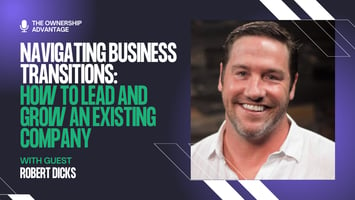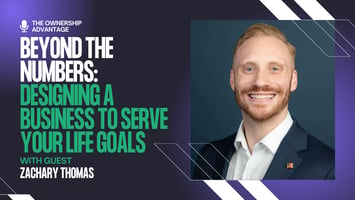The Power of Buying Versus Starting From Scratch
The Power of Alignment and Intentional Choices: Lessons from Justin Dixon’s Entrepreneurial Leap
In a recent episode of The Ownership Advantage, host Tanner sat down with Justin Dixon, founder and CEO of Hire Tomorrow, to explore the transformative path from corporate comfort to entrepreneurial ownership. What emerged was a rich conversation on risk management, intentional living, and the evolving landscape of hiring in the age of AI. Here’s a comprehensive look at the insightful lessons shared throughout their discussion.
Taking the Leap: The Importance of Intentional Preparation
Justin Dixon’s story isn’t the typical overnight leap into entrepreneurship. Instead, it’s a blueprint for calculated, collaborative risk. Both Justin and his wife are self-admittedly risk-averse, which fueled them to spend nearly two years building a solid foundation before he exited the security of a six-figure corporate recruiting job.
Preparing for this leap meant more than simply saving money—it meant strategically downgrading their lifestyle. While friends were upgrading homes and vehicles, the Dixons downsized: renting out their Philadelphia condo, moving to a smaller apartment, and paring down to one car. This wasn’t about deprivation, but discernment. “We weren’t overly restrictive,” Justin said. “We were just saying, what is waste? What can we constrain?” Their goal was clear: reduce expenses to the point where a single salary could cover them, creating a soft landing for entrepreneurial uncertainty.
This process, Justin notes, was made possible by unwavering alignment with his spouse. Having a partner who’s “locked at the hip” in both vision and practicality, he shares, is paramount—for mental stability, decision-making, and resilience amid storms like the pandemic.
The Role of Support and Alignment
One of the most striking themes throughout the episode is the power of aligned relationships. Justin credits much of his journey’s success—not just launching Hire Tomorrow, but weathering the 2020 hiring freeze—to a partnership of mutual support.
“We were always pretty much aligned,” he recounts, “when it came to our ideal future.” In difficult times—like starting a business just before a global shutdown—his wife’s support wasn’t just helpful, it was essential. She maintained her own career, never expressed blame, and kept their shared vision at the forefront.
For listeners considering similar leaps, Justin’s advice is clear: deep alignment with your partner isn’t optional. It’s the foundation that keeps you moving forward when plans shift unexpectedly.
Smart Hiring: Why Small Businesses Need Strategic Recruitment
As the episode shifts to the evolution of Hire Tomorrow, Justin highlights a core challenge for startups and small businesses: hiring the right people—especially when resources are limited, and roles often blend disparate skillsets.
Many small businesses, he observes, use what he calls the “post and pray” method: post a job and hope the right candidate applies. This leads to frustration when jack-of-all-trades roles go unfilled, or, when hired, lead to high turnover. Justin’s approach involves entering the process early—helping clients define roles realistically, avoid scope creep, and navigate hiring hurdles before they become expensive mistakes.
He also reframes risk, asking which is safer: having all your income tied to one employer, or spreading it across dozens of clients? For entrepreneurs, diversification is a key advantage.
AI and the Future of Recruitment
No conversation about modern entrepreneurship is complete without AI. Justin acknowledges the hype—many tools are little more than wrappers over existing technology—but insists that intentional, focused adoption is crucial.
He uses AI as a thought partner and to increase efficiency but warns against letting automation replace irreplaceable human elements, especially in executive hiring or candidate interviews where liability, nuance, and empathy matter. AI, he contends, can get you “70-80% of the way there”—but strategic oversight and specialized expertise remain essential.
Systems & Delegation: The True Ownership Advantage
One of Justin’s biggest lessons: true ownership means letting go—especially of tasks you no longer need to own. He speaks passionately about hiring a top-notch virtual assistant, arguing that holding onto tasks out of ego is “stealing” from someone who could do them better and with more joy. Delegation, systemization, and focusing on what truly drives your business forward are the ultimate levers of freedom and growth.
Final Thoughts
Justin Dixon’s journey is a masterclass in intentional decision-making, partnership, and adaptation. For anyone eyeing the transition from operator to owner—or rethinking the systems that underpin their life and business—his story offers proof that clarity, alignment, and the smart integration of new tools can chart a path to real, lasting freedom.
Check out the full episode on YouTube HERE
Listen to the full episode on Apple Podcasts HERE


